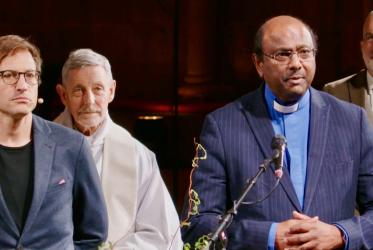*By Rhoda Mphande
Racism is a curse that continues to haunt the global community, with new forms constantly emerging. This curse brings us to the realisation that no country is free from racism and we cannot afford any attitude of pretence or denial that no further action is needed to focus on racial justice in order to re-establish human dignity and equal human rights on a global scale.
Gathering together from different parts of the world, ambassadors, citizens, representatives, religious leaders and other esteemed guests sat down on 9 May at the United Nations to discuss the issue at hand. The topic of racism attracted a diverse and multicultural audience, filling up the room with different colours and flavours. The ambassador and permanent observer of the African Union to the United Nations in Geneva His Excellency Ajay Kumar Bramdeo remarked that “the fact that this room is 99% full today is an expression of our interest and commitment to combat this type of behaviour and values, and the desire to work together in multilateral forums to effectively stop these kinds of practices”.
An opening statement by Ambassador Idriss Jazairy, executive director of the Geneva Centre, who was the moderator of the Emergency Assembly, set the heart and foundation of the debate as he commented that “the recent spike of attacks we have seen in March 2019 in New Zealand, in April in Srilanka and also in California are a reminder that the rise of hate, hatred and supremacist’s ideology erupts into violence completely unexpectedly”. He further added that “history and the evolution of society proves that without a doubt, it is empathy and not ethnicity that creates a community and lays a foundation for sustainable and inclusive societies”.
The message behind all the panellists carried the same essence that we, those who stand against racism and any other related racial injustices, must forcefully express our belief that it is possible to live together with our differences. Amongst the panellists was Rev. Dr Jin Yang Kim, coordinator of the Pilgrim Teams for Justice and Peace at the World Council of Churches (WCC), who proclaimed that “there is an urgent need that embracing ‘the other’ as an extension of ourselves is an imperative in our time. We need to see ‘others’ as a reflection of ourselves. If we do not try to know ‘the other,’ how can we ever know God?”
This year, WCC addresses racism as the thematic focus of the Pilgrimage of Justice and Peace. This is expressed in the design of Pilgrim Team Visits, the WCC commitment to human rights; work on migration, racial discrimination and statelessness; work with indigenous peoples; and cooperation with the United Nations.
In closing, the moderator posed a question to the WCC panellist Kim asking, “how does the church and religious leaders plan to protect worshipping places from violence?” Kim responded by affirming that “the active promotion of mutual trust between inter-faith communities is essential in the fight against xenophobia and racism. Religious leaders are responsible for the mutual trust. To achieve this urgent task, they are strongly committed to foster effective mechanisms for inter-religious cooperation to combat violence which challenges fundamentalisms, religious extremisms, and divisive ideologies and invites people to the rich treasures of all religions. Places of worship must be open and fulfilling this beauty of religions.”
Overcoming racism and the need to focus attention on human dignity have been a major concern for WCC over several decades and will continue to be so until justice and peace prevails.
* Rhoda Mphande is a Communications Intern at the World Council of Churches




